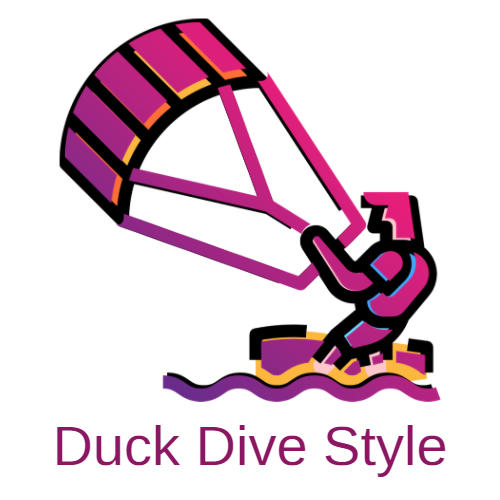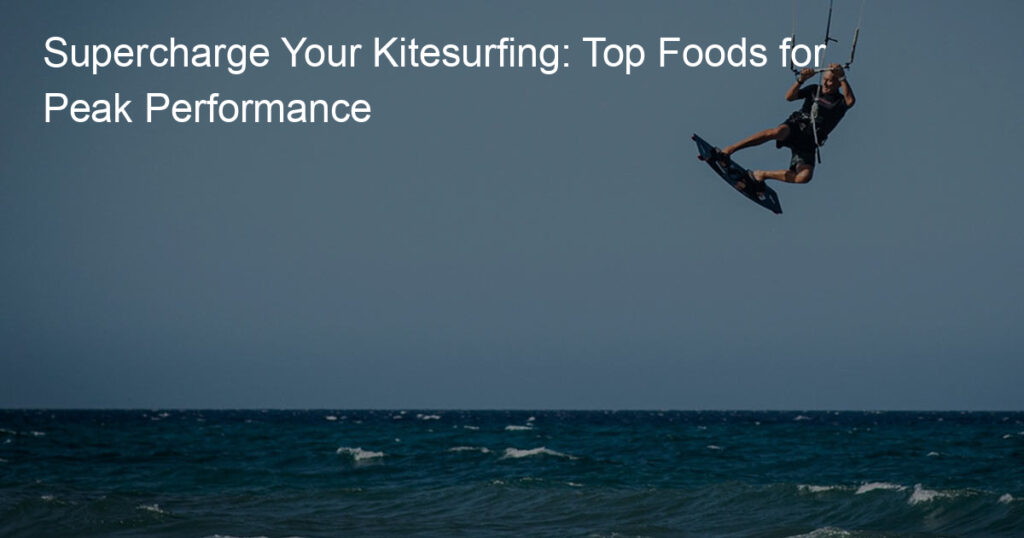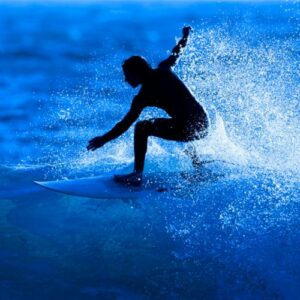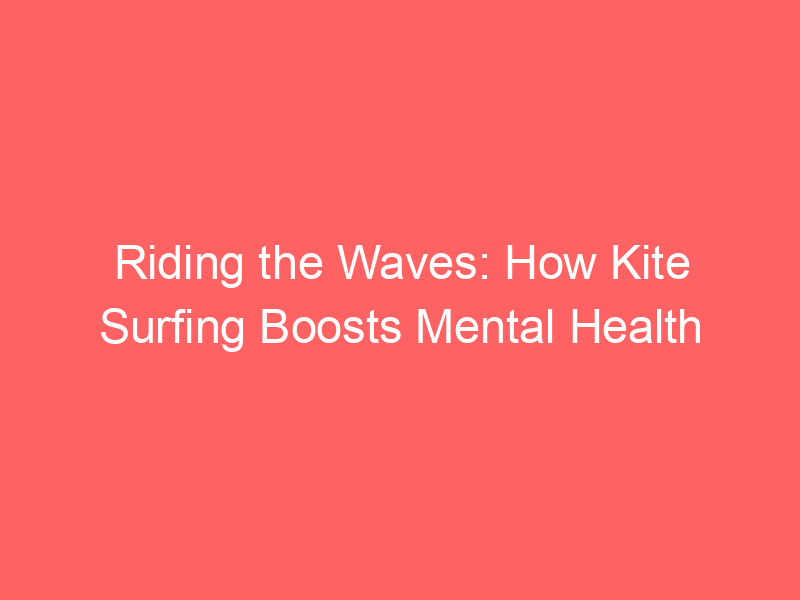Introduction: The Importance of Nutrition for Surfers
As a surfer, you may be aware of the importance of physical strength and endurance. However, the role of nutrition in enhancing your performance is often overlooked. This article aims to shed light on the significance of a balanced diet for surfers, particularly those who enjoy kitesurfing.
- Nutrition as a Key Factor in Surfing Performance
- How the Right Diet Can Supercharge Your Kitesurfing
When it comes to surfing, your body requires a significant amount of energy. This energy is derived from the food you consume. A well-balanced diet can help improve your stamina, strength, and overall performance. According to a Wikipedia study, surfers who maintain a healthy diet have shown a marked improvement in their surfing skills.
Kitesurfing is a high-intensity sport that demands a lot from your body. The right nutrition can provide the energy you need to perform your best. A diet rich in proteins, carbohydrates, and healthy fats can supercharge your kitesurfing experience. It can help you maintain your energy levels, recover faster, and reduce the risk of injuries. In the next sections, we will delve deeper into the specifics of a kitesurfing diet and how to make the most of it.
Kitesurfing Diet: What You Need to Know
Kitesurfing is an exciting and physically demanding sport. To perform at your best, it’s crucial to fuel your body with the right nutrients. Let’s dive into the basics of nutrition for surfers.
Nutrition for Surfers: The Basics
Understanding the basics of nutrition can help you make better food choices and improve your kitesurfing performance. Here are the key components of a surfer’s diet:
- The role of carbohydrates, proteins, and fats in a surfer’s diet
- Importance of hydration for kitesurfers
Carbohydrates are your body’s primary source of energy. They fuel your muscles and brain during intense kitesurfing sessions. Proteins are essential for muscle repair and growth, while fats provide a concentrated source of energy. A balanced diet for kitesurfers should include a mix of these nutrients. For instance, whole grains are a good source of carbohydrates, lean meats provide proteins, and avocados and nuts are rich in healthy fats.
Staying hydrated is crucial for any athlete, and kitesurfers are no exception. Water regulates your body temperature, lubricates your joints, and helps transport nutrients to give you energy and keep you healthy. When you’re out on the water, you can lose fluids quickly through sweat. Therefore, it’s important to drink plenty of water before, during, and after your kitesurfing sessions to stay hydrated and maintain peak performance.
Remember, a well-balanced diet and proper hydration are key to your success in kitesurfing. By understanding and applying these basic nutrition principles, you can fuel your body for optimal performance and recovery.
Performance Boosting Foods for Kitesurfers
As a kitesurfer, your diet plays a crucial role in your performance. The right foods can provide the energy you need to ride the waves and recover quickly after an intense session. Let’s explore some of the best foods to include in your kitesurfing diet.
- Whole Grains for Sustained Energy
- Lean Proteins for Muscle Recovery
- Fruits and Vegetables for Vitamins and Minerals
Whole grains like brown rice, oatmeal, and whole wheat bread are excellent sources of complex carbohydrates. These carbs are broken down slowly in your body, providing a steady stream of energy throughout your kitesurfing session. According to a Wikipedia article, whole grains are also rich in fiber, which aids in digestion and keeps you feeling full longer.
Protein is essential for muscle recovery after a strenuous kitesurfing session. Lean proteins such as chicken, turkey, fish, and tofu are excellent choices. They provide the amino acids your muscles need to repair and grow stronger. A Wikipedia article states that proteins are also crucial for the production of antibodies, enzymes, and hormones in the body.
Fruits and vegetables are packed with vitamins and minerals that support overall health and enhance performance. For instance, bananas are rich in potassium, which helps prevent muscle cramps. Oranges, strawberries, and bell peppers are high in vitamin C, which boosts the immune system and aids in collagen production. A Wikipedia article explains that vitamins are essential for various bodily functions, including energy production and bone health.
Remember, a well-balanced diet is key to optimal performance in kitesurfing. Incorporate these foods into your meals to fuel your body and boost your performance on the waves.
Best Foods for Kitesurfing: A Closer Look
When it comes to kitesurfing, your diet plays a crucial role in your performance. The right foods can provide you with the energy you need to stay out on the water longer and perform at your best. Let’s take a closer look at some of the best foods for kitesurfing.
High Energy Foods for Surfers
As a kitesurfer, you need foods that can provide you with quick and long-lasting energy. Here are a couple of top picks:
- Bananas: Bananas are a natural source of quick energy. They are packed with potassium, which can help prevent muscle cramps during your kitesurfing session. Plus, they are easy to digest, making them a perfect snack before or during your surfing. Learn more about bananas on Wikipedia.
- Quinoa: Quinoa is a high-protein grain that can provide long-lasting energy. It’s also rich in fiber, which can help keep you feeling full and focused during your kitesurfing session. Quinoa is a versatile food that can be incorporated into a variety of meals, making it a great choice for kitesurfers. Learn more about quinoa on Wikipedia.
Remember, everyone’s body is different, and what works for one person may not work for another. It’s important to experiment with different foods to see what gives you the most energy and helps you perform at your best while kitesurfing.
Surfing Performance Nutrition: Hydration
Hydration is a key factor in any sport, and kitesurfing is no exception. It’s crucial to maintain a healthy hydration level to ensure optimal performance and safety. Let’s delve into why water is so important for kitesurfers and how electrolyte drinks can help.
- Why water is crucial for kitesurfers
Water is the lifeblood of our bodies, making up about 60% of our body weight. It plays a vital role in every bodily function, from regulating body temperature to aiding in digestion. For kitesurfers, staying hydrated is particularly important. Kitesurfing is a physically demanding sport that can lead to significant water loss through sweat. This can result in dehydration, which can impair muscle function, reduce endurance, and increase the risk of heat-related illnesses. According to a Wikipedia article on dehydration, even a 2% decrease in body water can lead to a noticeable decrease in physical performance. Therefore, it’s crucial for kitesurfers to drink plenty of water before, during, and after their sessions to replenish lost fluids and maintain peak performance.
- Electrolyte drinks: When and how to use them
While water is essential, it’s not the only thing kitesurfers need to stay hydrated. Electrolytes, which are minerals like sodium, potassium, and magnesium, are also crucial. They help regulate nerve and muscle function, balance blood acidity and pressure, and rebuild damaged tissue. When you sweat, you not only lose water but also electrolytes. Drinking water alone won’t replace these lost electrolytes, which is where electrolyte drinks come in.
Electrolyte drinks, often referred to as sports drinks, contain water and electrolytes to help replenish what’s lost in sweat. They’re particularly useful for long kitesurfing sessions or in hot, humid conditions when sweat loss is high. To use them effectively, drink them during and after your kitesurfing session. However, be mindful of their sugar content. Some sports drinks can be high in sugar, so look for those with low or no added sugars to avoid unnecessary calories.
Kitesurfing Energy Diet: Meal Planning Tips
As a kitesurfer, your diet plays a crucial role in your performance. Proper meal planning can help you maximize your energy and endurance. Let’s delve into the specifics of pre-surfing meals.
Pre-Surfing Meals
What you eat before you hit the waves can significantly impact your surfing session. It’s important to fuel your body with the right nutrients to ensure optimum energy and stamina.
- What to eat before a surfing session for maximum energy
- Timing your meals: How long before surfing should you eat?
Complex carbohydrates are your best bet for sustained energy. Foods like whole grains, fruits, and vegetables are excellent choices. They provide a slow and steady release of energy, keeping you fueled throughout your session. Protein is also essential to maintain muscle strength. Opt for lean sources like chicken, fish, or plant-based proteins.
It’s recommended to eat your pre-surf meal about 2-3 hours before you start. This gives your body ample time to digest the food and convert it into energy. Eating too close to your session could lead to discomfort and sluggishness. Remember, everyone’s body is different. Listen to yours and adjust your meal timing accordingly.
By paying attention to both what you eat and when you eat, you can ensure that your body is well-prepared for the physical demands of kitesurfing. Remember, a well-planned diet is a key component of a successful kitesurfing session.
Post-Surfing Nutrition
After a thrilling session of kite surfing, your body needs to replenish its energy stores and repair any muscle damage. This is where post-surfing nutrition comes into play. Let’s explore the best recovery foods and the role of protein in muscle recovery.
- Recovery Foods: What to eat after a surfing session
- Fruits: Fruits like bananas and oranges are packed with essential vitamins and minerals that help replenish energy and hydrate your body.
- Protein-rich foods: Foods like lean meats, eggs, and beans are excellent sources of protein, which is vital for muscle recovery.
- Whole grains: Foods like brown rice and whole grain bread provide complex carbohydrates that restore your body’s glycogen levels, providing sustained energy.
- The Role of Protein in Muscle Recovery
Recovery foods are crucial in replenishing your body’s energy stores and aiding muscle repair. Here are some of the best foods to consume after a kite surfing session:
Protein plays a significant role in muscle recovery after a strenuous kite surfing session. When you surf, your muscles undergo wear and tear. Consuming protein after your session aids in repairing these damaged muscles, promoting faster recovery and growth. According to a Wikipedia article, consuming 20-30 grams of protein after exercise can maximize muscle recovery and growth. Foods rich in protein include lean meats, eggs, dairy products, and legumes.
In conclusion, post-surfing nutrition is crucial for replenishing energy and aiding muscle recovery. Consuming a balanced meal of fruits, protein-rich foods, and whole grains can help you recover faster and get ready for your next kite surfing session.
Nutrition Tips for Kitesurfers: Making the Most of Your Diet
When it comes to kitesurfing, your diet plays a crucial role in your performance. A well-balanced diet can provide the energy you need to ride the waves and help your body recover afterwards. Here are some tips on how to make the most of your diet.
How to Balance Your Diet for Optimal Energy and Recovery
For optimal energy and recovery, it’s important to consume a balanced diet that includes carbohydrates, proteins, and fats. Carbohydrates are your body’s main source of energy. They fuel your muscles and brain during intense physical activity like kitesurfing. Proteins, on the other hand, are essential for muscle recovery and growth. They help repair the muscle tissues that get damaged during physical activity. Lastly, fats are a concentrated source of energy. They also help absorb vitamins and protect your vital organs.
Here’s a simple guideline to balance your diet:
Food Group Percentage of Daily Calorie Intake Carbohydrates 45-65% Proteins 10-35% Fats 20-35% Supplements for Surfers: Are They Necessary?
Supplements can be a helpful addition to a kitesurfer’s diet, but they are not a replacement for a balanced diet. They can fill nutritional gaps and provide extra energy and endurance. However, it’s important to remember that not all supplements are created equal. Some may have side effects or may not provide the promised benefits.
Before starting any supplement regimen, it’s best to consult with a healthcare professional. They can provide personalized advice based on your health status and nutritional needs. Some common supplements for surfers include multivitamins, protein powders, and omega-3 fatty acids. But remember, these should complement a balanced diet, not replace it.
Conclusion: Supercharge Your Kitesurfing with the Right Diet
As we wrap up this comprehensive guide on nutrition for kitesurfing, let’s take a moment to recap the key points and share some final tips to help you implement a kitesurfing energy diet effectively.
- Recap of the importance of nutrition for kitesurfing performance
- Final tips for implementing a kitesurfing energy diet
Nutrition plays a pivotal role in enhancing your kitesurfing performance. A well-balanced diet not only fuels your body for the intense physical demands of the sport but also aids in quick recovery, helping you get back on the board faster. From proteins that repair and build muscles to carbohydrates that provide energy, every nutrient has a specific role to play. Remember, the right diet can be the difference between a good and a great kitesurfing session.
Implementing a kitesurfing energy diet can seem daunting at first, but with a few simple tips, you can make the transition smoothly. Start by planning your meals around your kitesurfing sessions. Prioritize complex carbohydrates before your session for sustained energy and lean proteins afterwards for muscle recovery. Stay hydrated and include a variety of fruits and vegetables in your diet for a wide range of essential vitamins and minerals. Lastly, remember that everyone’s body is different. What works for one person may not work for another, so listen to your body and adjust your diet accordingly.
In conclusion, a well-planned, nutritious diet can supercharge your kitesurfing performance. It’s not just about the waves and the wind; it’s also about what you put in your body. So, take the time to plan your meals, eat right, and watch your performance soar!








